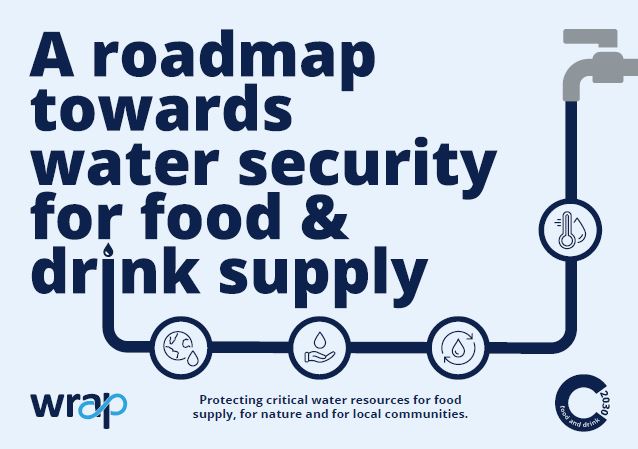
- 50 leading UK food and drink companies officially support the new Water Roadmap to help deliver the UK’s Courtauld Commitment 2030 water target and UN Sustainable Development Goals.
- Roadmap to improve quality and availability of water in 20 sourcing areas and work towards the target of sourcing 50% of the UK’s fresh food from areas with sustainable water management.
- The many supporters include key names such as Asda, Co-op, Coca Cola GB, M&S, Nestle UK & Ireland, Sainsbury’s and Tesco – more organisations are urged to join.
With COP26 highlighting the urgent need to act on water security and biodiversity, and UN predictions of a 40% global shortfall in water by 2030, WRAP is calling on all UK food & drink organisations to support the new Water Roadmap and adopt the actions it outlines.
WRAP, in partnership with WWF, The Rivers Trust and many other supporting organisations, today launches the Roadmap towards Water Security for the Food & Drink Supply (the ‘Water Roadmap’) to protect vital water resources for the benefit of nature, local communities and the food and drink sector.
The Water Roadmap explained
Co-ordinated by the UK’s leading sustainability charity WRAP, the Water Roadmap will be delivered by a coalition of water stewardship expert bodies, on-the-ground delivery agencies and UK food and drink organisations. The Water Roadmap builds on the success of the Courtauld Commitment Water Ambition to deliver even more ambitious changes across the food system in support of the new Courtauld Commitment 2030 target and the UN’s Sustainable Development Goals (SDGs).
Launched in July 2021, WRAP’s Courtauld Commitment 2030 set the following targets for water:
- As well as businesses continuing to increase water use efficiency in their own operations, our combined objective is that by 2030, the UK food & drink industry will have helped to attain sustainable water management to improve the quality and availability of water at catchment scale in the top 20 most important product & ingredient sourcing areas in the UK and overseas.
- By 2030, the target is for 50% of the UK’s fresh food to be sourced from areas with sustainable water management.
Combined, these targets will contribute directly towards achieving UN SDG 6, as well as protecting and restoring biodiversity and working towards Net Zero goals through implementing nature-based solutions.
Reaching these ambitious targets will need action both from those leading businesses that are already committed to the Courtauld Commitment 2030, and from any UK food and drink business that relies on the availability of clean water in their operations or supply chains.
Karen Fisher, Head of Climate Action Strategy at WRAP said:
“The facts around the threats to water quality and availability are stark and will be worsened by climate change. All organisations that rely on water resources have a duty to take action to protect them and we must act now. Water is a shared resource, impacted by a wide range of users and critical to sustain nature and local communities. Given the necessity of water to produce our food and drink and the scale of water use for food production globally, it is vital that as an industry we set a goal for action. The Water Roadmap provides a practical mechanism for food and drink businesses to know what actions they can most meaningfully take to help achieve this goal. I urge other organisations to join those that have already given their commitment to help protect this critical resource.”
The new Water Roadmap directly addresses the climate risk and food security issues surrounding water stewardship whilst highlighting the need for urgent adaptation and action. It includes:
- The actions organisations need to take individually and collectively, to help deliver this vision – progressing through the five stages of the WWF water stewardship ladder.
- The milestones that we need UK food and drink businesses to reach along this shared journey
- The delivery and governance framework – including the steps to develop and deliver water stewardship projects.
- The reporting framework – ensuring accountability, providing assurance that the right level of progress is being made and that intended outcomes are being achieved.
A total of 65 supporters, including 50 leading food & drink organisations such as Asda, Co-op, Coca Cola GB, M&S, Nestle UK & Ireland, Sainsbury’s and Tesco, are already supporting the Water Roadmap, and WRAP is calling for more to join this growing movement of companies, who are committed to taking action on water.
Andy Roby, Senior Water Security Adviser, Foreign Commonwealth and Development Office said:
“Recognising that the UK has a responsibility to help ensure sustainable water use in the locations that it sources products and ingredients from globally, the UK Government was instrumental in launching the Glasgow Declaration for Fair Water Footprints at COP26, to help transform the way the world’s water resources are managed and build climate resilience. Signatories to the Declaration commit to a series of actions, including accelerating credible water stewardship. This new Water Roadmap is an excellent example of a sectoral response to the Glasgow Declaration and provides a practical mechanism for food & drink businesses to take action in support of its objectives.”
Mark Lloyd, CEO, The Rivers Trust said:
“The race to climate resilience and water security will be won or lost on our rivers – and right now we are losing: only 14% are in good ecological health and every single one fails to meet chemical standards. Although the issues are complex, the solutions – nearly all of which are nature based and deliver multiple benefits – are tried, tested and ready to be rolled out.
David Edwards, Director of Food Strategy, WWF-UK said:
“The Roadmap towards Water Security for Food & Drink Supply is a world-leading example of a whole-sector commitment to address water challenges in shared sourcing landscapes. The Roadmap recognises that it is only through working together towards common goals and addressing the management of water at a catchment scale, can we genuinely achieve sustainability for water in our fruit and vegetable imports.”
The Courtauld 2030 water target is hugely ambitious and will not be easy but with the support, commitment and influence of those businesses who have committed so far we are hopeful that it can be achieved. Because if we can’t do this we certainly won’t be able to achieve the changes required to reverse the climate and biodiversity emergency.”
An interactive launch webinar at 2pm on Weds 24th November will hear from industry leaders and water stewardship experts successfully delivering projects in the UK and overseas who have joined the Roadmap to further their sustainability goals. The session will explain how this practical work is benefiting suppliers at a local level and helping build resilience to current and future risks. The webinar will highlight how to get involved and there will be the opportunity to put questions to the expert panel. Please register here.
The urgent need for water security
As highlighted in the recent IPCC Sixth Assessment Report, the need for climate adaptation actions, as well as emissions reductions, has never been greater. WRAP advocates that water security and supply should be central to the climate crisis discussion: agricultural supply chains use 70% of global freshwater resources, and the UN predicts that global demand for fresh water will exceed supply by 40% by 2030. Climate change is increasing pressures further, with more unpredictable weather and the disruption faced from both water scarcity and flooding.
Protecting water resources is therefore a critical concern for the food and drink supply, the protection of nature and local communities and to aid the achievement of Net Zero.
Key facts on water:
- Global demand for water is projected to increase by 50% by 2030 (Food and Agriculture Organization of the UN) and the UN projects a 40% global water shortfall by 2030.
- FAO estimates that 1/6th of the world population lives in a rural area with very high water constraints and competition for available supplies.
- In the UK, the Environment Agency has warned that every day 3,400 million extra litres of water could be required by 2050 if no action is taken.
- WWF estimates that agricultural effluent is responsible for 78% of ocean and freshwater eutrophication globally and is a key driver of biodiversity loss in rivers, lakes and wetlands.
- In England, only 14% of rivers are in good ecological health, and all fail to meet chemical standards. Of these failing rivers, agriculture impacts nearly two thirds (Rivers Trust).
- The Taskforce on Climate-related Financial Disclosures (TCFD) identifies water security as one of the most material climate-related risks relevant to the food industry.
- CDP estimates that, for food & drink businesses, the cost of inaction on water security is 20 times the cost of action.
COP26 and the Water Roadmap
Recognising that the UK has a responsibility to ensure sustainable water use in the locations that it sources products and ingredients from globally, the UK Government launched the Glasgow Declaration for Fair Water Footprints at COP26. This is a ground-breaking step towards transforming the way the world’s water resources are managed, to build climate resilience and support the needs of ecosystems, communities and businesses. Signatories to the Declaration commit to a series of actions, including accelerating credible water stewardship, to help achieve SDG 6. The Water Roadmap provides the practical mechanism for food and drink businesses to act in support of the Glasgow Declaration, and WRAP will formalise this link as delivery plans for the declaration develop.
